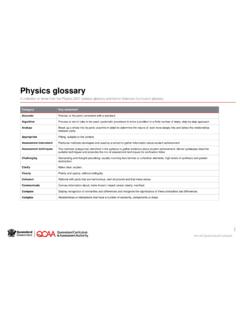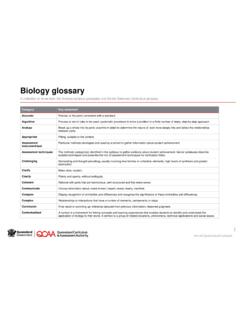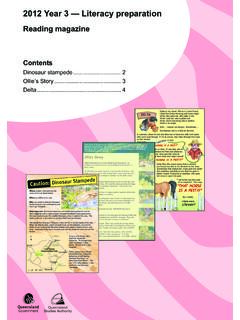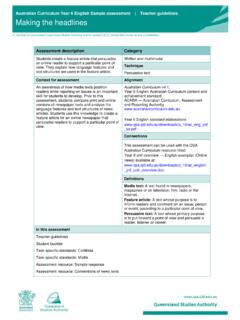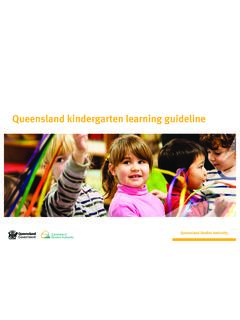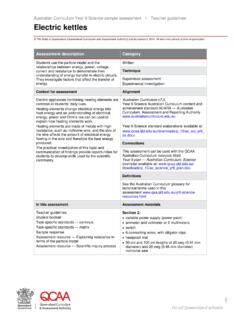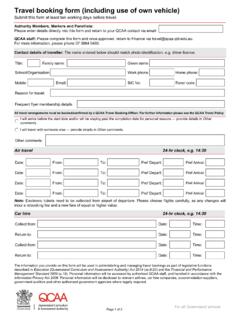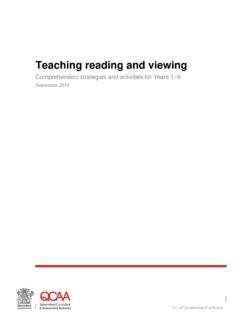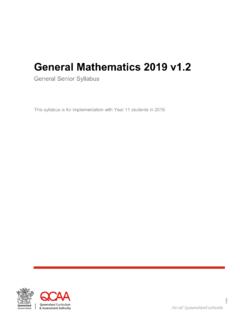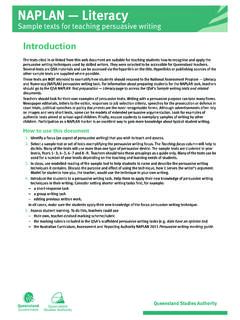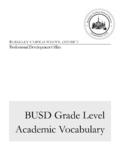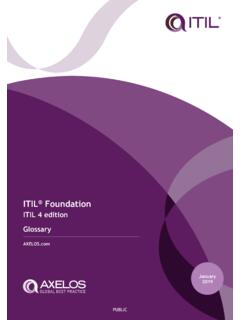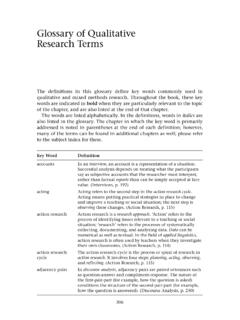Transcription of Glossary of cognitive verbs - General syllabuses
1 180008 Glossary of cognitive verbs General syllabuses January 2018 Glossary of cognitive verbs General syllabuses Queensland Curriculum & Assessment Authority January 2018 Page 2 of 6 Glossary of cognitive verbs Term Explanation A analyse dissect to ascertain and examine constituent parts and/or their relationships; break down or examine in order to identify the essential elements, features, components or structure; determine the logic and reasonableness of information; examine or consider something in order to explain and interpret it, for the purpose of finding meaning or relationships and identifying patterns, similarities and differences apply use knowledge and understanding in response to a given situation or circumstance; carry out or use a procedure in a given or particular situation appraise evaluate the worth, significance or status of something; judge or consider a text or piece of work appreciate recognise or make a judgment about the value or worth of something; understand fully; grasp the full implications of argue give reasons for or against something; challenge or debate an issue or idea; persuade, prove or try to prove by giving reasons assess measure, determine, evaluate, estimate or make a judgment about the value, quality, outcomes, results, size, significance, nature or extent of something C calculate determine or find ( a number, answer) by using mathematical processes; obtain a numerical answer showing the relevant stages in the working.
2 Ascertain/determine from given facts, figures or information categorise place in or assign to a particular class or group; arrange or order by classes or categories; classify, sort out, sort, separate clarify make clear or intelligible; explain; make a statement or situation less confused and more comprehensible classify arrange, distribute or order in classes or categories according to shared qualities or characteristics comment express an opinion, observation or reaction in speech or writing; give a judgment based on a given statement or result of a calculation communicate convey knowledge and/or understandings to others; make known; transmit compare display recognition of similarities and differences and recognise the significance of these similarities and differences comprehend understand the meaning or nature of; grasp mentally conduct direct in action or course; manage; organise; carry out consider think deliberately or carefully about something, typically before making a decision; take something into account when making a judgment; view attentively or scrutinise; reflect on Glossary of cognitive verbs General syllabuses Queensland Curriculum & Assessment Authority January 2018 Page 3 of 6 Term Explanation construct create or put together ( an argument) by arranging ideas or items; display information in a diagrammatic or logical form; make; build contrast display recognition of differences by deliberate juxtaposition of contrary elements; show how things are different or opposite.
3 Give an account of the differences between two or more items or situations, referring to both or all of them throughout create bring something into being or existence; produce or evolve from one's own thought or imagination; reorganise or put elements together into a new pattern or structure or to form a coherent or functional whole critique review ( a theory, practice, performance) in a detailed, analytical and critical way D decide reach a resolution as a result of consideration; make a choice from a number of alternatives deduce reach a conclusion that is necessarily true, provided a given set of assumptions is true; arrive at, reach or draw a logical conclusion from reasoning and the information given define give the meaning of a word, phrase, concept or physical quantity; state meaning and identify or describe qualities demonstrate prove or make clear by argument, reasoning or evidence, illustrating with practical example; show by example; give a practical exhibition derive arrive at by reasoning; manipulate a mathematical relationship to give a new equation or relationship; in mathematics, obtain the derivative of a function describe give an account (written or spoken) of a situation, event, pattern or process, or of the characteristics or features of something design produce a plan, simulation, model or similar; plan, form or conceive in the mind; in English, select, organise and use particular elements in the process of text construction for particular purposes.
4 These elements may be linguistic (words), visual (images), audio (sounds), gestural (body language), spatial (arrangement on the page or screen) and multimodal (a combination of more than one) determine establish, conclude or ascertain after consideration, observation, investigation or calculation; decide or come to a resolution develop elaborate, expand or enlarge in detail; add detail and fullness to; cause to become more complex or intricate devise think out; plan; contrive; invent differentiate identify the difference/s in or between two or more things; distinguish, discriminate; recognise or ascertain what makes something distinct from similar things; in mathematics, obtain the derivative of a function discriminate note, observe or recognise a difference; make or constitute a distinction in or between; differentiate; note or distinguish as different Glossary of cognitive verbs General syllabuses Queensland Curriculum & Assessment Authority January 2018 Page 4 of 6 Term Explanation discuss examine by argument; sift the considerations for and against; debate; talk or write about a topic, including a range of arguments, factors or hypotheses; consider, taking into account different issues and ideas, points for and/or against, and supporting opinions or conclusions with evidence distinguish recognise as distinct or different; note points of difference between; discriminate; discern.
5 Make clear a difference/s between two or more concepts or items document support ( an assertion, claim, statement) with evidence ( decisive information, written references, citations) E evaluate make an appraisal by weighing up or assessing strengths, implications and limitations; make judgments about ideas, works, solutions or methods in relation to selected criteria; examine and determine the merit, value or significance of something, based on criteria examine investigate, inspect or scrutinise; inquire or search into; consider or discuss an argument or concept in a way that uncovers the assumptions and interrelationships of the issue execute apply a procedure to familiar task; perform a procedure without significant error, but not necessarily understanding how and why the procedure works; produce in accordance with a plan or design; put into effect, a plan, order or course of action experiment try out or test new ideas or methods, especially in order to discover or prove something; undertake or perform a scientific procedure to test a hypothesis, make a discovery or demonstrate a known fact explain make an idea or situation plain or clear by describing it in more detail or revealing relevant facts; give an account; provide additional information explore look into both closely and broadly; scrutinise; inquire into or discuss something in detail express convey, show or communicate ( a thought, opinion, feeling, emotion, idea or viewpoint); (in words, art, music or movement) convey or suggest a representation of; depict extrapolate infer or estimate by extending or projecting known information; conjecture.
6 Infer from what is known; extend the application of something ( a method or conclusion) to an unknown situation by assuming that existing trends will continue or similar methods will be applicable G generate produce; create; bring into existence H hypothesise formulate a supposition to account for known facts or observed occurrences; conjecture, theorise, speculate; especially on uncertain or tentative grounds Glossary of cognitive verbs General syllabuses Queensland Curriculum & Assessment Authority January 2018 Page 5 of 6 Term Explanation I identify distinguish; locate, recognise and name; establish or indicate who or what someone or something is; provide an answer from a number of possibilities; recognise and state a distinguishing factor or feature implement put something into effect, a plan or proposal infer derive or conclude something from evidence and reasoning, rather than from explicit statements; listen or read beyond what has been literally expressed; imply or hint at interpret use knowledge and understanding to recognise trends and draw conclusions from given information; make clear or explicit; elucidate or understand in a particular way; bring out the meaning of, a dramatic or musical work, by performance or execution; bring out the meaning of an artwork by artistic representation or performance; give one's own interpretation of.
7 Identify or draw meaning from, or give meaning to, information presented in various forms, such as words, symbols, pictures or graphs investigate carry out an examination or formal inquiry in order to establish or obtain facts and reach new conclusions; search, inquire into, interpret and draw conclusions about data and information J judge form an opinion or conclusion about; apply both procedural and deliberative operations to make a determination justify give reasons or evidence to support an answer, response or conclusion; show or prove how an argument, statement or conclusion is right or reasonable M make decisions select from available options; weigh up positives and negatives of each option and consider all the alternatives to arrive at a position manipulate adapt or change to suit one's purpose modify change the form or qualities of; make partial or minor changes to something O organise arrange, order; form as or into a whole consisting of interdependent or coordinated parts, especially for harmonious or united action P predict give an expected result of an upcoming action or event.
8 Suggest what may happen based on available information propose put forward ( a point of view, idea, argument, suggestion) for consideration or action prove use a sequence of steps to obtain the required result in a formal way Glossary of cognitive verbs General syllabuses Queensland Curriculum & Assessment Authority January 2018 Page 6 of 6 Term Explanation R realise create or make ( a musical, artistic or dramatic work); actualise; make real or concrete; give reality or substance to recall remember; present remembered ideas, facts or experiences; bring something back into thought, attention or into one s mind recognise identify or recall particular features of information from knowledge; identify that an item, characteristic or quality exists; perceive as existing or true; be aware of or acknowledge reflect on think about deeply and carefully resolve (in the Arts) consolidate and communicate intent through a synthesis of ideas and application of media to express meaning S select choose in preference to another or others; pick out sequence place in a continuous or connected series; arrange in a particular order sketch execute a drawing or painting in simple form, giving essential features but not necessarily with detail or accuracy; in mathematics, represent by means of a diagram or graph; the sketch should give a General idea of the required shape or relationship and should include features solve find an answer to, explanation for, or means of dealing with ( a problem); work out the answer or solution to ( a mathematical problem).
9 Obtain the answer/s using algebraic, numerical and/or graphical methods structure give a pattern, organisation or arrangement to; construct or arrange according to a plan summarise give a brief statement of a General theme or major point/s; present ideas and information in fewer words and in sequence symbolise represent or identify by a symbol or symbols synthesise combine different parts or elements ( information, ideas, components) into a whole, in order to create new understanding T test take measures to check the quality, performance or reliability of something U understand perceive what is meant by something; grasp; be familiar with ( an idea); construct meaning from messages, including oral, written and graphic communication use operate or put into effect; apply knowledge or rules to put theory into practice
